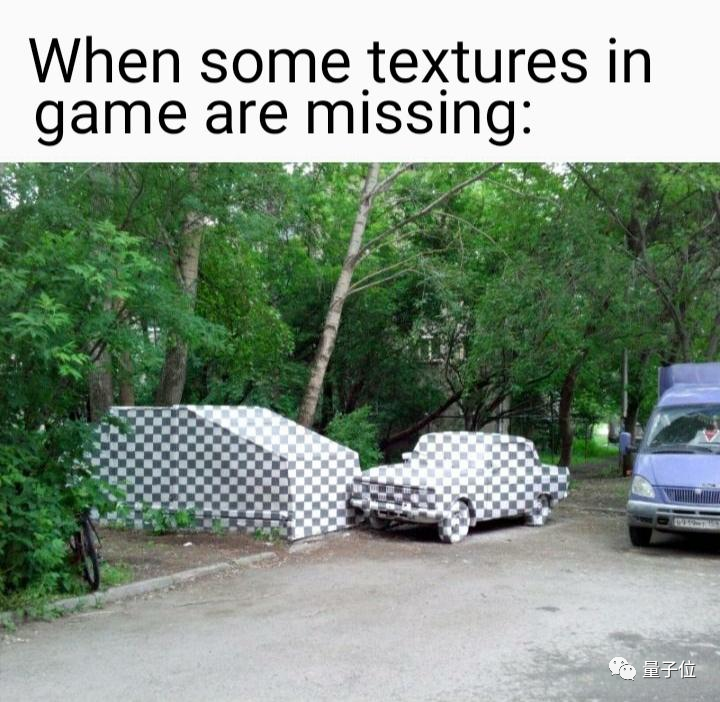 Technology peripherals
Technology peripherals
 AI
AI
 Easily complete 3D model texture mapping in 30 seconds, simple and efficient!
Easily complete 3D model texture mapping in 30 seconds, simple and efficient!
Easily complete 3D model texture mapping in 30 seconds, simple and efficient!
Use the diffusion model to generate textures for 3D objectsYou can do it in one sentence!
When you type "a chair with a brown and black geometric pattern", the diffusion model will immediately add an ancient texture to it, giving it a period feel
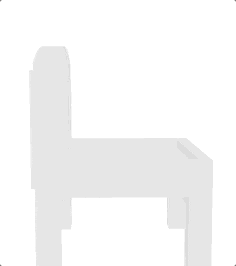
AI can immediately add detailed wooden textures to the desktop with imagination, even just a screenshot that cannot tell what the desktop looks like

You know, Adding texture to a 3D object is not just as simple as "changing the color".
When designing materials, you need to consider multiple parameters such as roughness, reflection, transparency, vortex, and bloom. In order to design good effects, you not only need to understand knowledge about materials, lighting, rendering, etc., but you also need to perform repeated rendering tests and modifications. If the material changes, you may need to restart the design
The content that needs to be rewritten is: the effect of texture loss in the game scene
However, previously used The textures designed by artificial intelligence are not ideal in appearance, so designing textures has always been a time-consuming and labor-intensive task, which has also resulted in higher costs.
Researchers from HKU, Hong Kong Chinese and TCL recently developed A new artificial intelligence method for designing 3D object textures. This method can not only perfectly retain the original shape of the object, but also design a more realistic texture that perfectly fits the surface of the object
This research has been included as an oral report paper in ICCV 2023
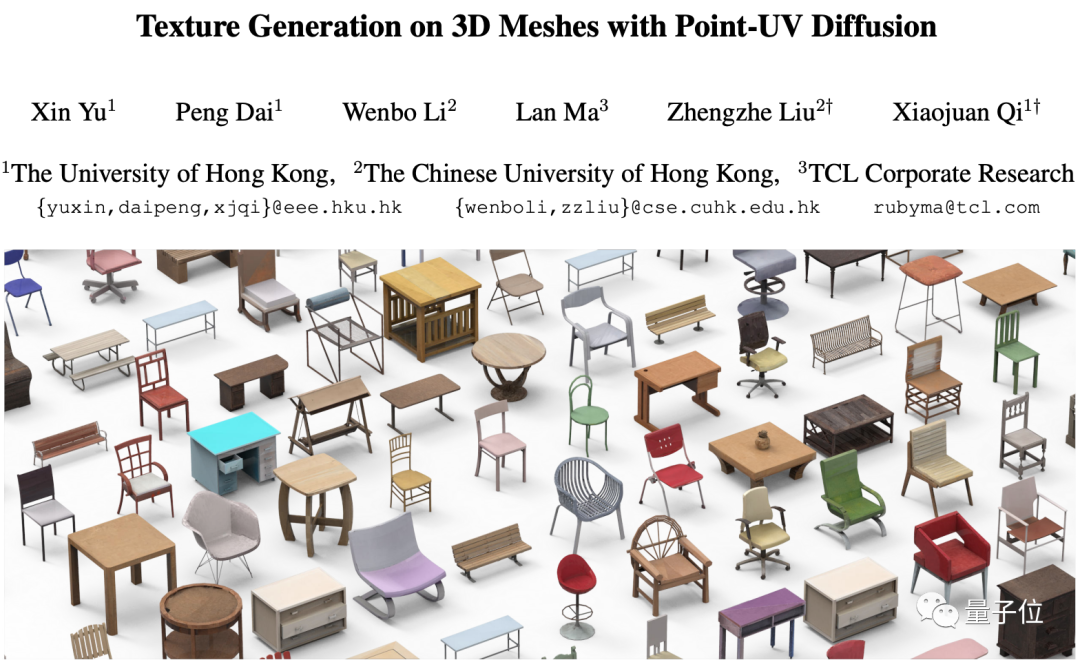
What we need to rewrite is: What is the solution to this problem? Let's take a look
Using the diffusion model, 3D texture can be done in one sentence
When using artificial intelligence to design 3D texture before, there were two main types of problems
Generation The texture is unrealistic and has limited details.
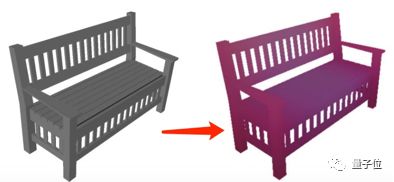
During the generation process, the geometry of the 3D object itself will be specially processed, making the generated texture unable to perfectly fit the original object. , strange shapes will "pop out"
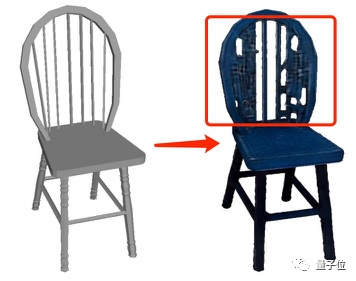
Therefore, in order to ensure the stability of the 3D object structure while generating detailed and realistic textures, this research designed a tool called Point-UV diffusion framework.
This framework includes two modules: "rough design" and "finishing", both of which are based on the diffusion model, but the diffusion models used in the two are different.
First in the "rough design" module, train a 3D diffusion model with shape features (including surface normals, coordinates and masks) as input conditions to predict the shape of the object The color of each point in it, thereby generating a rough texture image effect:

In the "Finishing" module, a 2D diffusion model is also designed for further utilization The previously generated rough texture images and object shapes are used as input conditions to generate finer textures

The reason for adopting this design structure is the previous high-resolution point cloud generation The calculation cost of the method is usually too high
With this two-stage generation method, not only can the calculation cost be saved, so that the two diffusion models can play their own roles, but compared with the previous method, not only the original 3D The structure of the object and the generated texture are also more refined
As for controlling the generated effect by inputting text or pictures, it is the "contribution" of CLIP.
In order not to change the original meaning, the content needs to be rewritten into Chinese. What needs to be rewritten is: for the input, the author will first use the pre-trained CLIP model to extract the embedding vector of the text or image, then input it into an MLP model, and finally integrate the conditions into "rough design" and "finishing" In the two-stage network
, the final output result can be achieved by controlling the texture generated through text and images
So, what is the implementation effect of this model?
The generation speed is reduced from 10 minutes to 30 seconds
Let us first take a look at the generation effect of Point-UV diffusion
As can be seen from the renderings, in addition to tables and chairs, Point -UV diffusion can also generate textures for objects such as cars, with a richer variety
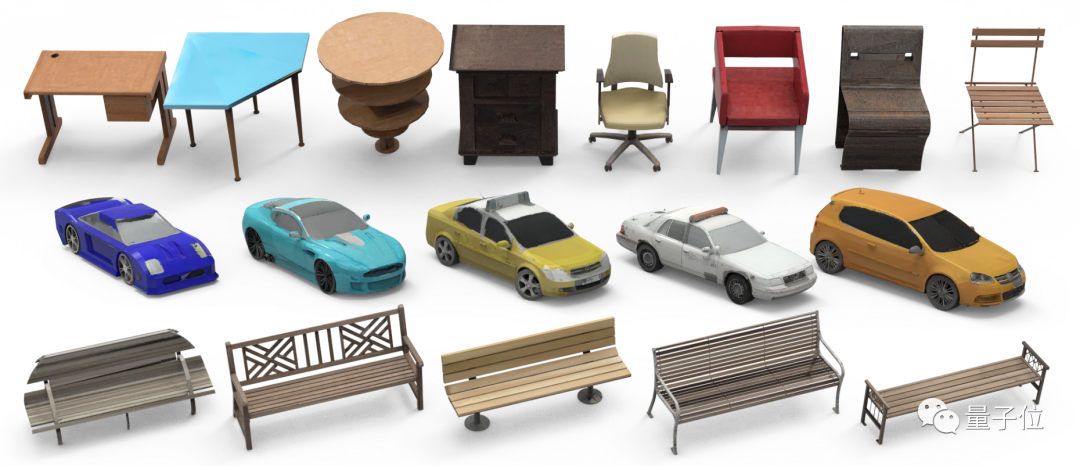
It can not only generate textures based on text:
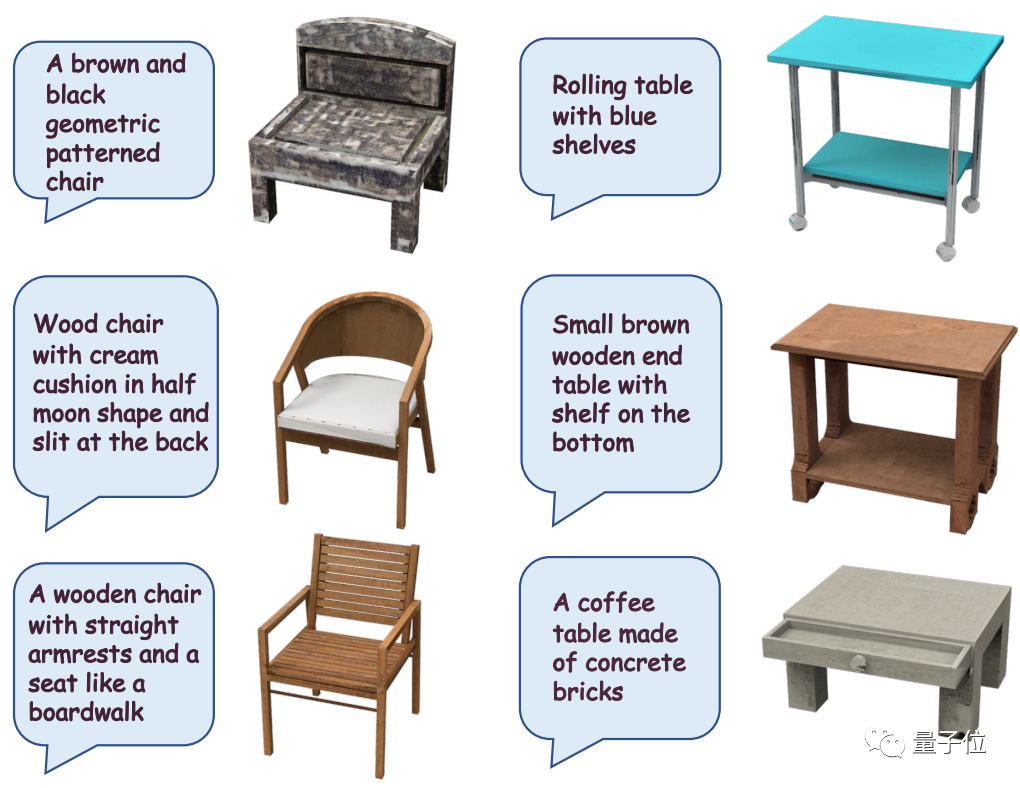
The texture effect of the corresponding object can also be generated based on an image:
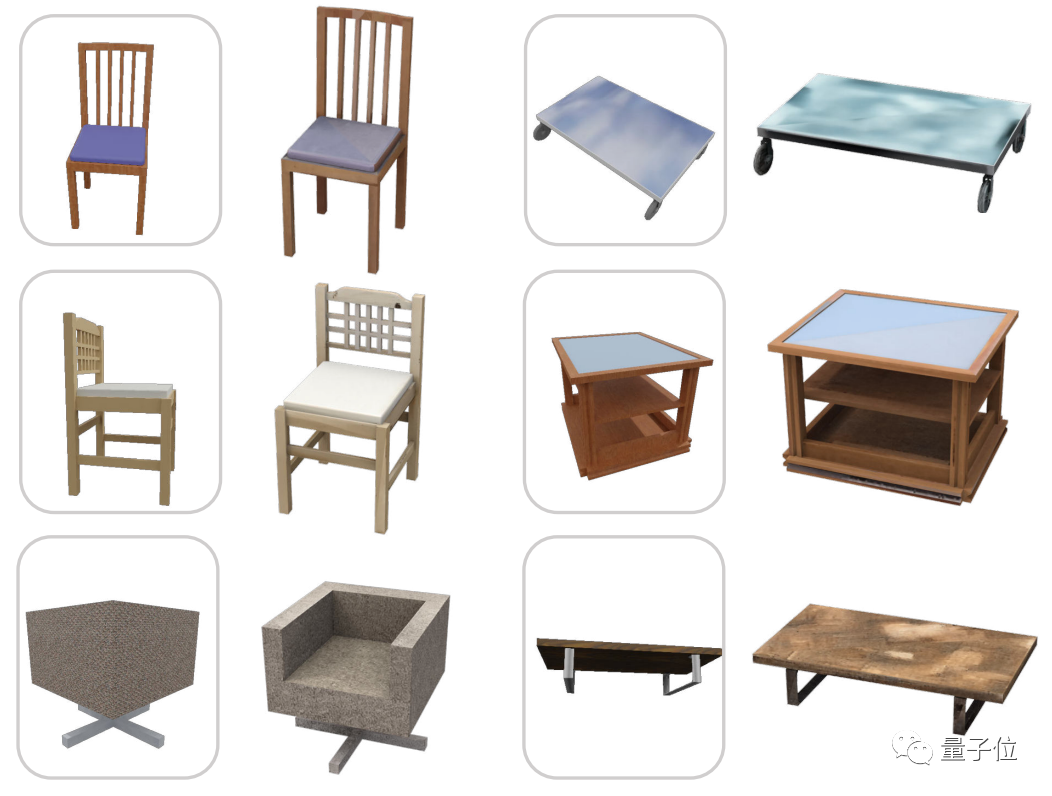
The authors also compared the texture effect generated by Point-UV diffusion with the previous method
By observing the chart, you can find that compared with other texture generation models such as Texture Fields, Texturify, PVD-Tex, etc., Point-UV diffusion shows better results in terms of structure and fineness
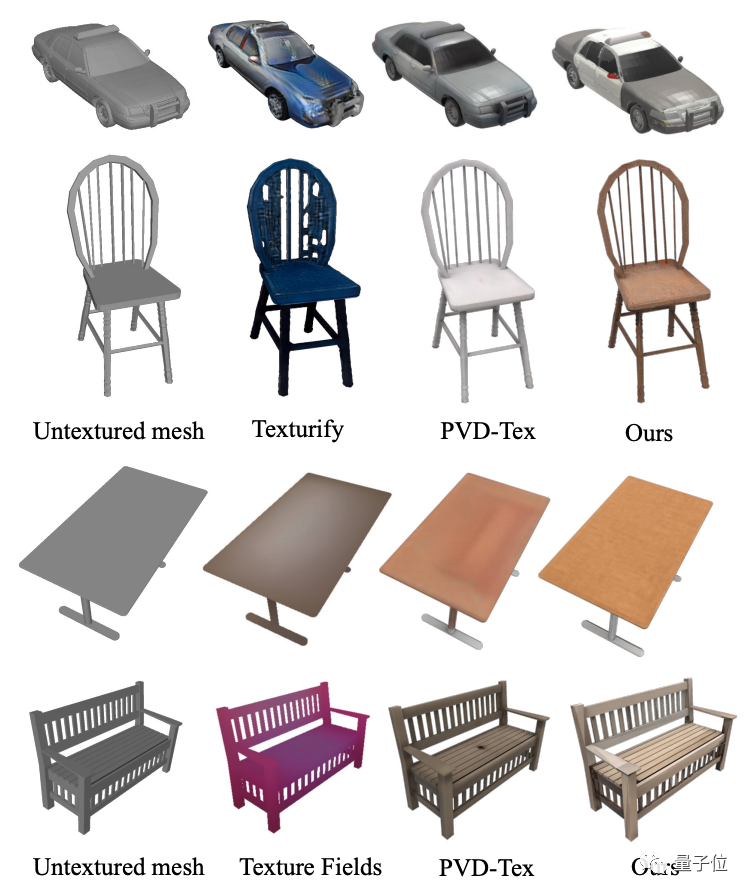
The author also mentioned that under the same hardware configuration, compared to Text2Mesh which takes 10 minutes to calculate, Point-UV diffusion only takes 30 seconds.

However, the author also pointed out some current limitations of Point-UV diffusion. For example, when there are too many "fragmented" parts in the UV map, it still cannot achieve a seamless texture effect. In addition, due to the reliance on 3D data for training, the refined quality and quantity of 3D data currently cannot reach the level of 2D data, so the generated effect cannot yet achieve the refined effect of 2D image generation
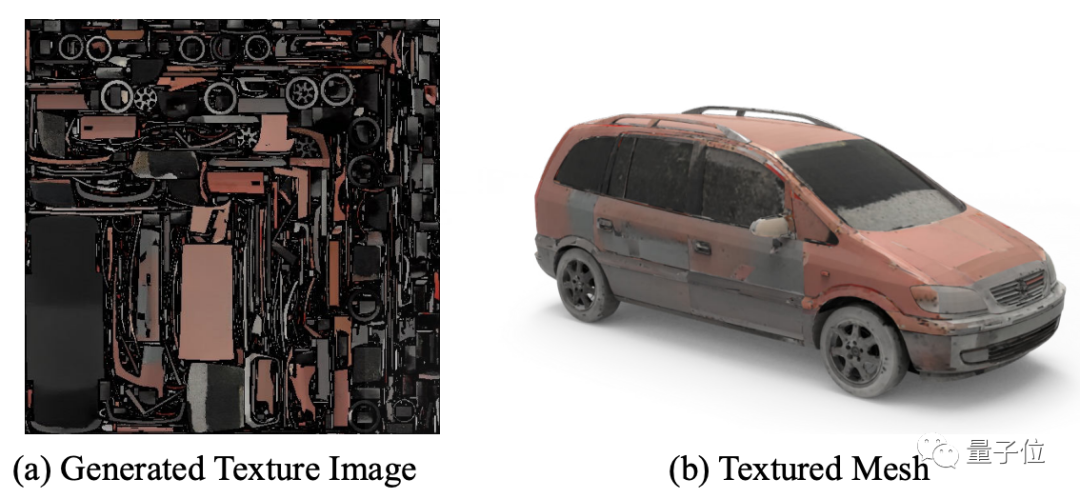
For those who are interested in this research, you can click on the link below to read the paper~
Paper address: https://cvmi- lab.github.io/Point-UV-Diffusion/paper/point_uv_diffusion.pdf
Project address (still under construction): https://github. com/CVMI-Lab/Point-UV-Diffusion
The above is the detailed content of Easily complete 3D model texture mapping in 30 seconds, simple and efficient!. For more information, please follow other related articles on the PHP Chinese website!

Hot AI Tools

Undresser.AI Undress
AI-powered app for creating realistic nude photos

AI Clothes Remover
Online AI tool for removing clothes from photos.

Undress AI Tool
Undress images for free

Clothoff.io
AI clothes remover

Video Face Swap
Swap faces in any video effortlessly with our completely free AI face swap tool!

Hot Article

Hot Tools

Notepad++7.3.1
Easy-to-use and free code editor

SublimeText3 Chinese version
Chinese version, very easy to use

Zend Studio 13.0.1
Powerful PHP integrated development environment

Dreamweaver CS6
Visual web development tools

SublimeText3 Mac version
God-level code editing software (SublimeText3)

Hot Topics
 Top 10 latest releases of virtual currency trading platforms for bulk transactions
Apr 22, 2025 am 08:18 AM
Top 10 latest releases of virtual currency trading platforms for bulk transactions
Apr 22, 2025 am 08:18 AM
The following factors should be considered when choosing a bulk trading platform: 1. Liquidity: Priority is given to platforms with an average daily trading volume of more than US$5 billion. 2. Compliance: Check whether the platform holds licenses such as FinCEN in the United States, MiCA in the European Union. 3. Security: Cold wallet storage ratio and insurance mechanism are key indicators. 4. Service capability: Whether to provide exclusive account managers and customized transaction tools.
 Summary of the top ten Apple version download portals for digital currency exchange apps
Apr 22, 2025 am 09:27 AM
Summary of the top ten Apple version download portals for digital currency exchange apps
Apr 22, 2025 am 09:27 AM
Provides a variety of complex trading tools and market analysis. It covers more than 100 countries, has an average daily derivative trading volume of over US$30 billion, supports more than 300 trading pairs and 200 times leverage, has strong technical strength, a huge global user base, provides professional trading platforms, secure storage solutions and rich trading pairs.
 What are the top ten virtual currency trading apps? Recommended on the top ten digital currency exchange platforms
Apr 22, 2025 pm 01:12 PM
What are the top ten virtual currency trading apps? Recommended on the top ten digital currency exchange platforms
Apr 22, 2025 pm 01:12 PM
The top ten secure digital currency exchanges in 2025 are: 1. Binance, 2. OKX, 3. gate.io, 4. Coinbase, 5. Kraken, 6. Huobi, 7. Bitfinex, 8. KuCoin, 9. Bybit, 10. Bitstamp. These platforms adopt multi-level security measures, including separation of hot and cold wallets, multi-signature technology, and a 24/7 monitoring system to ensure the safety of user funds.
 What are the stablecoins? How to trade stablecoins?
Apr 22, 2025 am 10:12 AM
What are the stablecoins? How to trade stablecoins?
Apr 22, 2025 am 10:12 AM
Common stablecoins are: 1. Tether, issued by Tether, pegged to the US dollar, widely used but transparency has been questioned; 2. US dollar, issued by Circle and Coinbase, with high transparency and favored by institutions; 3. DAI, issued by MakerDAO, decentralized, and popular in the DeFi field; 4. Binance Dollar (BUSD), cooperated by Binance and Paxos, and performed excellent in transactions and payments; 5. TrustTo
 How many stablecoin exchanges are there now? How many types of stablecoins are there?
Apr 22, 2025 am 10:09 AM
How many stablecoin exchanges are there now? How many types of stablecoins are there?
Apr 22, 2025 am 10:09 AM
As of 2025, the number of stablecoin exchanges is about 1,000. 1. Stable coins supported by fiat currencies include USDT, USDC, etc. 2. Cryptocurrency-backed stablecoins such as DAI and sUSD. 3. Algorithm stablecoins such as TerraUSD. 4. There are also hybrid stablecoins.
 What are the next thousand-fold coins in 2025?
Apr 24, 2025 pm 01:45 PM
What are the next thousand-fold coins in 2025?
Apr 24, 2025 pm 01:45 PM
As of April 2025, seven cryptocurrency projects are considered to have significant growth potential: 1. Filecoin (FIL) achieves rapid development through distributed storage networks; 2. Aptos (APT) attracts DApp developers with high-performance Layer 1 public chains; 3. Polygon (MATIC) improves Ethereum network performance; 4. Chainlink (LINK) serves as a decentralized oracle network to meet smart contract needs; 5. Avalanche (AVAX) trades quickly and
 Which of the top ten transactions in the currency circle? The latest currency circle app recommendations
Apr 24, 2025 am 11:57 AM
Which of the top ten transactions in the currency circle? The latest currency circle app recommendations
Apr 24, 2025 am 11:57 AM
Choosing a reliable exchange is crucial. The top ten exchanges such as Binance, OKX, and Gate.io have their own characteristics. New apps such as CoinGecko and Crypto.com are also worth paying attention to.
 What is DLC currency? What is the prospect of DLC currency
Apr 24, 2025 pm 12:03 PM
What is DLC currency? What is the prospect of DLC currency
Apr 24, 2025 pm 12:03 PM
DLC coins are blockchain-based cryptocurrencies that aim to provide an efficient and secure trading platform, support smart contracts and cross-chain technologies, and are suitable for the financial and payment fields.



